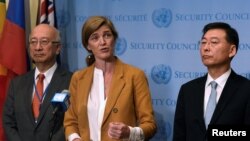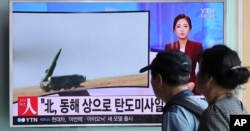The U.N. Security Council has swiftly and strongly condemned North Korea’s latest ballistic missile launches and threatened to take “further significant measures” if necessary.
The 15-nation council agreed on the statement Tuesday, just hours after it met in emergency session. It unanimously said Pyongyang’s launches on Monday of three Rodong missiles that traveled 1,000 kilometers before landing in Japan’s air defense identification zone were “a grave violation of the Democratic People’s Republic of Korea’s international obligations” under a series of Security Council resolutions.
“The members of the Security Council deplore all the Democratic People’s Republic of Korea’s ballistic missile activities, including these launches,” said New Zealand’s Ambassador Gerard van Bohemen, who is president of the council this month. Such activities "contribute to the DPRK’s development of nuclear weapons delivery systems, and they raise tension.”
Beijing's position
The council’s swift agreement on the statement could be a sign of Beijing’s growing frustration with its rogue ally. This week’s launches notably occurred while China was hosting world leaders at the G-20 summit.
Council members warned North Korea to “refrain from further actions, including nuclear tests, in violation of the relevant Security Council resolutions," and to comply fully with Pyongyang's obligations under those resolutions. The council ordered the committee that oversees sanctions to intensify its work to enforce those measures and urged states to redouble their efforts to implement measures laid out in council resolutions.
Earlier, U.S. Ambassador Samantha Power told reporters that “there were very strong and numerous voices in the room for doing more,” and added that “we are also interested in increasing the consequences after this pattern of using these launches to advance the capabilities of the program.”
The council met Tuesday behind closed doors at the urgent request of the U.S., Japan and South Korea. Earlier Tuesday, President Barack Obama and South Korean President Park Geun-hye met on the sidelines of the ASEAN summit in Laos. Park called the missile tests "fundamentally threatening." Obama said they were "provocative."
Consequences for launches?
“I felt very encouraged that in the council meeting itself, there was a much stronger show of unity,” Japan’s Ambassador Koro Bessho said. “All members recognized these launches as blatant violations of Security Council resolutions and other commitments by North Korea, and they all opposed or condemned the launch in very strong terms.”
Power noted that North Korea has conducted 22 launches so far this year that have demonstrated advancement of its ballistic missile program.
“Once the DPRK has the capability to do so, we know what they intend to do with these missile systems, because they have told us — they are explicit — they intend to arm the systems with nuclear weapons,” she said.
South Korea’s Deputy Ambassador Hahn Choong-hee said the international community must send a “clear and unequivocal message” that if the North Koreans continue to violate international commitments and sanctions, “they will face much stronger” and “significant countermeasures from the international community.”












